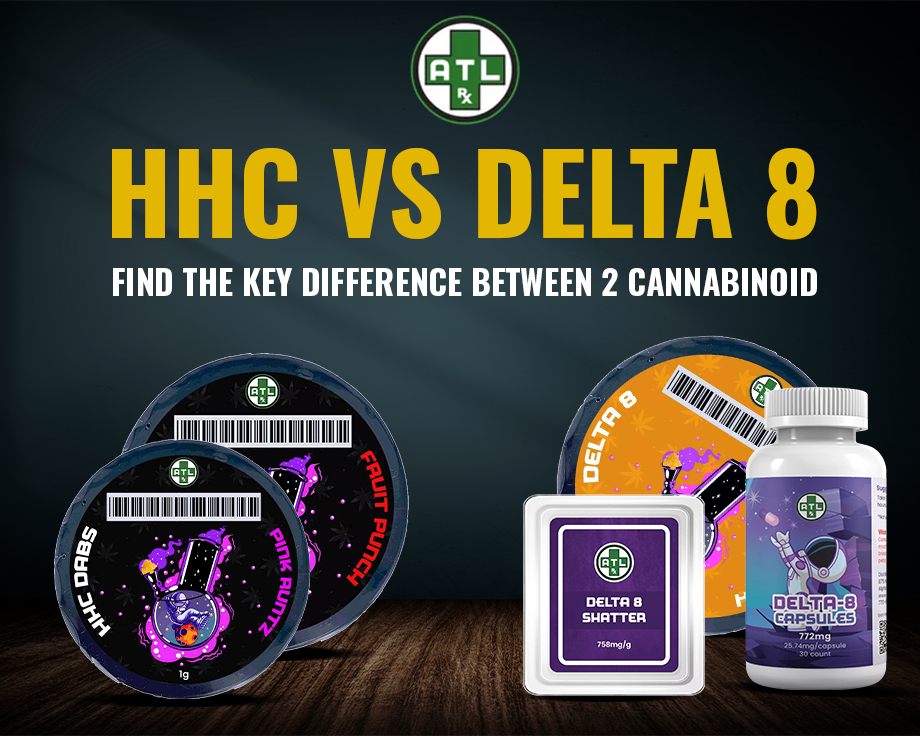If you’re exploring alternatives to traditional cannabis experiences, you’re likely encountering Delta 8 THC and Hexahydrocannabinol (HHC). Both cannabinoids offer unique effects and benefits, but they differ significantly in their chemical makeup and how they interact with your body. This guide will provide a thorough comparison of Delta 8 and HHC, shedding light on their distinct properties, effects, and how to choose the best products for your needs.
Understanding Delta 8 THC
Delta 8 THC, or Delta-8-tetrahydrocannabinol, is a lesser-known cannabinoid found in trace amounts in cannabis. Chemically similar to Delta 9 THC (the primary psychoactive compound in marijuana), Delta 8 THC shares the same molecular formula, C21H30O2. However, the placement of a double bond in the carbon chain differentiates the two: Delta 8 has this bond on the eighth carbon atom, while Delta 9 has it on the ninth.
This subtle structural difference leads to varied effects. Delta 8 THC binds primarily to the CB1 receptors in the central nervous system, but with less intensity compared to Delta 9. Users often report a milder psychoactive experience with less anxiety and a more relaxed high. Its enhanced stability means it has a longer shelf life and can be preferable for those seeking therapeutic benefits without intense psychoactive effects.
What Is HHC?
Hexahydrocannabinol (HHC) is a synthetic cannabinoid created by hydrogenating THC. Unlike Delta 8 and Delta 9 THC, HHC does not naturally occur in cannabis. Its chemical formula, C21H32O2, reflects its hydrogenated structure, which involves the addition of hydrogen atoms to the THC molecule. This process removes the double bonds in the carbon ring, making HHC a fully saturated cannabinoid.
HHC’s stability is a key feature, making it resistant to oxidation and degradation. It interacts with the endocannabinoid system, primarily binding to CB1 receptors, but the lack of double bonds results in different effects compared to traditional THC compounds. Users describe HHC’s effects as clear-headed and mildly euphoric, often less intense than Delta 9 THC but more potent than Delta 8.
Delta 8 vs. HHC: Key Differences
1. Potency and Effects
- Delta 8 THC: Known for a milder psychoactive effect, Delta 8 provides a more subtle high compared to Delta 9 THC. It’s preferred by those seeking a gentler experience with reduced anxiety.
- HHC: Generally more potent than Delta 8, HHC delivers a stronger and more enduring effect. Users find it offers a balanced high with less intensity than Delta 9 THC.
2. Consumer Preferences and Market Trends
- Delta 8: Appeals to those desiring a smoother, less intense experience. It’s gaining popularity for its balance of effects and relatively lower psychoactivity.
- HHC: Valued for its stability and stronger effects, HHC is becoming increasingly popular among users seeking more pronounced experiences.
3. Effects Comparison
- Delta 8 THC: Often described as providing a clear-headed high with mild euphoria. It’s favored for its therapeutic potential without overwhelming effects.
- HHC: Known for its more pronounced euphoria and relaxation. It may be detectable in drug tests due to its similarity to THC.
Consumption Methods for Delta 8 and HHC
Both Delta 8 and HHC can be consumed in various ways, each offering different onset times and effects:
- Vaping: Provides rapid effects through direct lung absorption. Delta 8 and HHC vape pens deliver quick and potent results.
- Edibles: Include gummies and chocolates, offering longer-lasting effects as they are absorbed through the digestive system.
- Tinctures: Taken sublingually for fast absorption into the bloodstream, providing a middle ground between vaping and edibles.
- Capsules: Offer precise dosing and prolonged effects similar to edibles.
- Topicals: Applied to the skin for localized relief without psychoactive effects.
Legal Status and Buying Guide
Legality
- Delta 8 THC: Often considered legal under federal law due to the 2018 Farm Bill, but state regulations vary. Some states have banned Delta 8, while others allow its sale and use.
- HHC: Faces a more ambiguous legal status. Its unique chemical structure places it in a legal gray area, with varying regulations by jurisdiction.
Top Brands for Delta 8 and HHC
After reviewing numerous options, these brands stand out:
- Exhale Wellness: Known for high-quality products, including Delta 8 Gummies and HHC Disposable Vapes.
- Budpop: Offers potent Delta 8 and HHC products with a reputation for effectiveness.
- Diamond CBD: Features a wide variety of Delta 8 and HHC products, catering to diverse preferences.
- Binoid: Provides affordable and flavorful options, including vape cartridges and gummies.
Conclusion
Delta 8 THC and HHC each offer distinct experiences within the cannabis world. Delta 8 is favored for its milder effects and stability, while HHC provides a stronger, more stable high. Understanding their differences will help you choose the product that best fits your preferences and needs. Always purchase from reputable vendors to ensure quality and compliance with local regulations.

